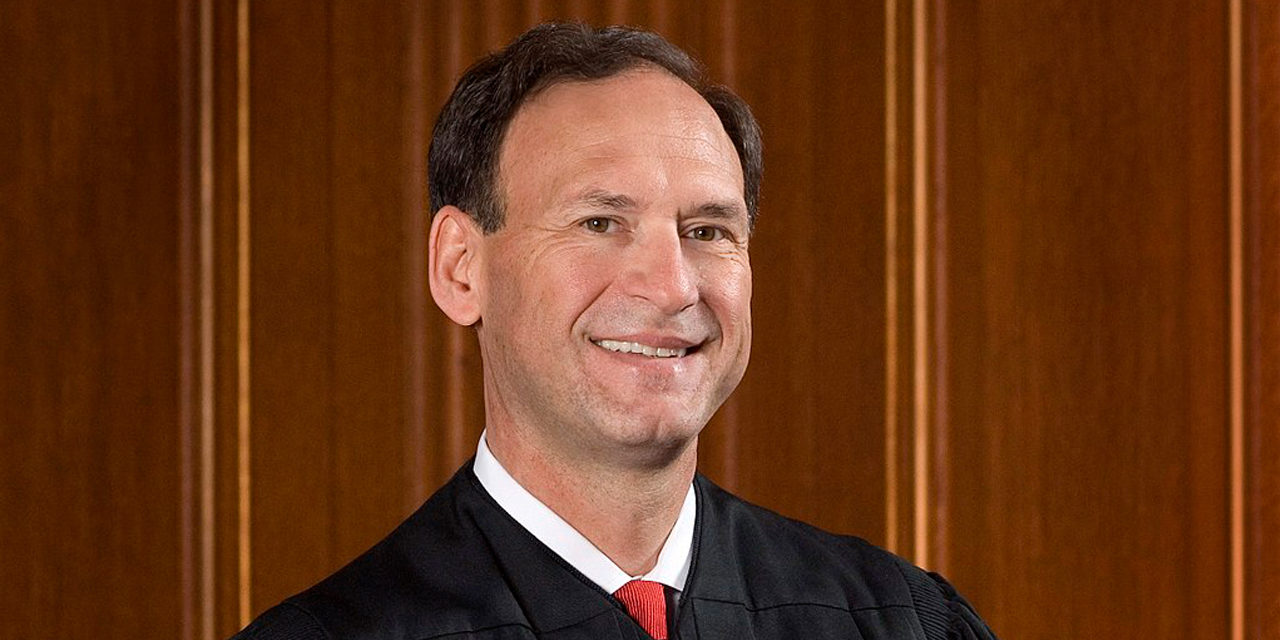One of the stalwarts on the conservative side of the U.S. Supreme Court is Justice Samuel Alito. Appointed by President George W. Bush in 2006, Alito, now 70 years old, also served on the 3rd U.S. Circuit Court of Appeals in Philadelphia from 1990 until his nomination to the high court. His 30 years of judicial service made him an obvious choice to address the Federalist Society’s annual conference on Thursday which carried the theme, “The Rule of Law and the Current Crisis.” Due to COVID-19 concerns, the annual meeting is being held by teleconference this year.
Alito’s speech addressed a number of topics, but religious freedom and individual liberty were by far the most prominent.
He was extremely candid in his remarks. With regard to the freedom of religion and COVID-19 restrictions, the justice noted the extraordinary restrictions being imposed on religious practice.
“The pandemic has resulted in previously unimaginable restrictions on individual liberty,” Alito said. “Now, notice what I am not saying or even implying. I am not diminishing the severity of the virus’ threat to public health. And putting aside what I will say shortly about a few Supreme Court cases, I’m not saying anything about the legality of COVID restrictions. Nor am I saying anything about whether any of these restrictions represent good public policy. I’m a judge, not a policymaker. All that I’m saying is this, and I think it is an indisputable statement of fact: we have never before seen restrictions as severe, extensive and prolonged as those experienced for most of 2020.
“Who could have imagined that the COVID crisis has served as a sort of constitutional stress test. And in doing so it has highlighted disturbing trends that were already present before the virus struck.”
Those “disturbing trends,” Alito noted, included treating the freedom of religion as a second-class right.
“Just as the COVID restrictions have highlighted the movement toward rule by experts, litigation about those restrictions, has pointed up emerging trends in the assessment of individual rights. This is especially evident with respect to religious liberty. It pains me to say this, but in certain quarters, religious liberty is fast becoming a disfavored right,” the justice said.
Alito expanded on that point by contrasting two recent Supreme Court cases. The first involved a COVID-related case from Nevada, where the governor allowed casinos to open at 50% capacity, but restricted churches of any size to only 50 people. The Supreme Court allowed that to continue, over his and two other justices’ objections to the disparate treatment of religion. In the other case, the high court chose not to defer to the Food and Drug Administration’s (FDA) rules on abortion pills in a case from Maryland. In that instance, the court allowed a lower court ruling to stand which waived – due to COVID-related concerns – the long-standing FDA rule that such pills be dispensed in person by a doctor. Why, Alito asked, did the “right” to an abortion carry more weight with the court than the freedom of religion?
The justice also questioned the long-standing persecution of The Little Sisters of the Poor because of the Obama Administration’s directive that employers provide coverage for abortion-causing contraceptives in their healthcare plans.
“The Little Sisters have been under unrelenting attack for the better part of a decade. Why? Because they refused to allow their health insurance plan to provide contraceptives to their employees. For that they were targeted by the prior administration. If they did not knuckle under and violate a tenet of their faith, they faced crippling fines, fines that would likely have forced them to shut down their homes.
“Last spring, the Little Sisters won their most recent battle in the Supreme Court – I should add by a vote of seven to two. But the case was sent back to the Court of Appeals. And the Little Sisters legal fight goes on and on.”
Alito also mentioned that the Obergefell same-sex marriage decision from 2015 has resulted in the very religion-bashing he predicted at the time. “You can’t say that marriage is the union between one man and one woman. Until very recently, that’s what the vast majority of Americans thought. Now, it’s considered bigotry,” he said.
The justice concluded by urging his audience to defend and build up the freedoms he argued are endangered.
“Liberty lies in the hearts of men and women. When it dies there, no constitution, no law, no court can do much to help it.”
Photo from Wikipedia






